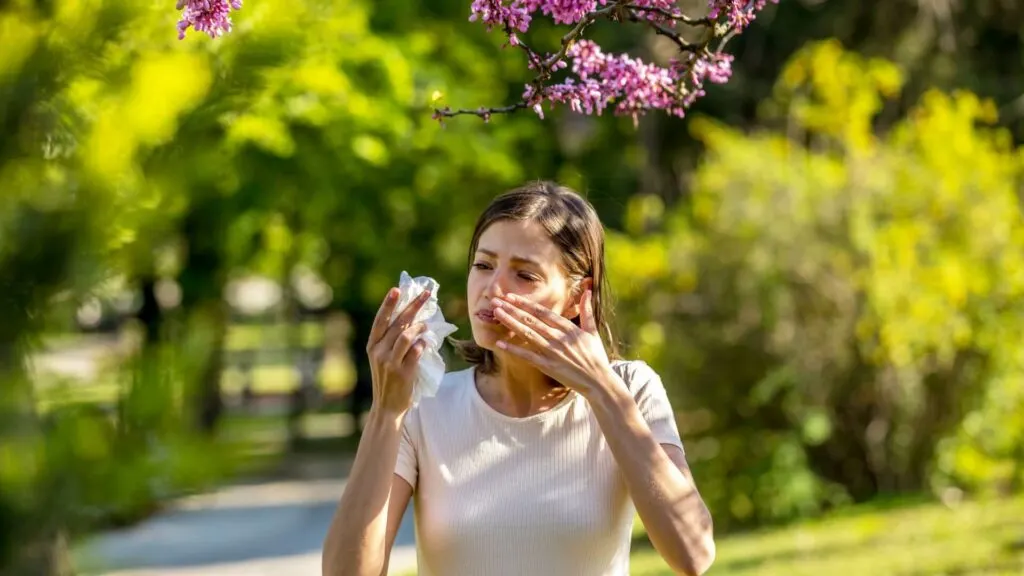Seasonal allergies, also known as hay fever or allergic rhinitis, affect millions of people worldwide. They are triggered by pollen from trees, grasses, and weeds, as well as mold spores that become airborne during certain times of the year. Common symptoms include sneezing, itching, nasal congestion, and watery eyes. These symptoms can significantly impact daily activities and reduce quality of life. Fortunately, there are various strategies to manage and alleviate seasonal allergies. Here are some effective ways to get rid of seasonal allergies and enjoy a more comfortable allergy season.

1. Identify Your Allergens
The first step in managing seasonal allergies is to identify what triggers your symptoms. Common seasonal allergens include pollen from trees, grasses, and weeds, as well as mold spores. Knowing your specific triggers can help you take targeted actions to avoid them.
You can identify your allergens by keeping a diary of your symptoms and noting when and where they occur. Allergy testing, such as skin prick tests or blood tests, can also provide precise information about what you’re allergic to. Once you know your triggers, you can take steps to minimize your exposure and manage your symptoms more effectively.
2. Try Homemade Remedies
Homemade allergy relief options can be effective for those seeking natural ways to manage their symptoms. Homemade remedies often use natural ingredients that can soothe symptoms without the side effects of some medications. For those looking solutions, options include saline nasal rinses and herbal teas.
A saline nasal rinse can help clear pollen and other allergens from your nasal passages. You can make a simple saline solution by mixing a teaspoon of salt with a cup of warm water. Using a neti pot or squeeze bottle, rinse your nasal passages with the solution to reduce congestion and irritation.
Herbal teas, such as peppermint or nettle tea, can also provide relief. Peppermint tea contains menthol, which acts as a natural decongestant, while nettle tea has anti-inflammatory properties that can help reduce allergy symptoms. Drinking these teas regularly during allergy season can help soothe your symptoms.

3. Keep Your Home Clean
Keeping your home clean is crucial in reducing indoor allergens that can exacerbate seasonal allergies. Regular cleaning can help minimize the presence of dust, pollen, and pet dander in your living space.
Vacuum your home frequently using a vacuum cleaner with a HEPA filter, which can trap small particles more effectively. Dust surfaces with a damp cloth to prevent dust from becoming airborne. Wash your bedding and curtains regularly in hot water to remove allergens. Additionally, keep windows closed during high pollen times and use air purifiers to reduce airborne allergens indoors.
4. Manage Outdoor Exposure
Managing your exposure to outdoor allergens is essential for reducing allergy symptoms. Taking a few precautions allows you to enjoy outdoor activities without suffering from severe allergic reactions.
Try to stay indoors during peak pollen times, usually in the early morning and late afternoon. If you need to go outside, wear sunglasses to protect your eyes and a mask to filter out pollen. When you return home, shower and change your clothes to remove any pollen that may have settled on you. These simple steps can help minimize your exposure to allergens and keep your symptoms under control.
5. Use Over-the-Counter Medications
Over-the-counter (OTC) medications can provide effective relief for many people suffering from seasonal allergies. These medications are readily available and can help alleviate a range of symptoms.
Antihistamines, such as loratadine (Claritin) and cetirizine (Zyrtec), can reduce sneezing, itching, and runny nose by blocking the action of histamine, a chemical released during an allergic reaction. Decongestants, like pseudoephedrine (Sudafed), can relieve nasal congestion by shrinking swollen nasal tissues. Nasal sprays, such as fluticasone (Flonase), can reduce nasal passages’ inflammation and relieve congestion and runny nose.

6. Consider Prescription Treatments
If over-the-counter medications are not providing sufficient relief, it may be time to consult your doctor about prescription treatments. Prescription medications can offer stronger relief and are tailored to your specific needs.
Common prescription treatments include antihistamines, corticosteroids, and leukotriene inhibitors. Antihistamines, such as desloratadine (Clarinex), can relieve sneezing, itching, and runny nose. Nasal corticosteroids, like mometasone (Nasonex), help reduce inflammation in the nasal passages. Leukotriene inhibitors, such as montelukast (Singulair), block chemicals that cause allergy symptoms and can be particularly effective for people with asthma-related allergies.
For more severe cases, allergy shots (immunotherapy) might be recommended. These shots gradually desensitize your immune system to specific allergens, reducing your symptoms. This treatment requires a long-term commitment but can provide significant and lasting relief.
7. Maintain a Healthy Diet
A healthy diet can play a crucial role in managing seasonal allergies. Certain foods can boost your immune system and reduce inflammation, helping to alleviate allergy symptoms.
Include plenty of fruits and vegetables in your diet, as they are rich in vitamins, minerals, and antioxidants. Foods high in omega-3 fatty acids, such as fish, walnuts, and flaxseeds, have anti-inflammatory properties that can help reduce allergy symptoms. Staying hydrated by drinking plenty of water can also help thin mucus and reduce congestion.
Avoid foods that can trigger allergies or worsen symptoms, such as dairy products, which can increase mucus production, and processed foods high in additives and preservatives. Maintaining a balanced diet can support your overall health and help your body better handle allergens.
8. Stay Updated on Pollen Counts
Monitoring pollen counts in your area can help you plan your activities and minimize exposure to allergens. Various weather websites and apps provide daily pollen forecasts, indicating the levels of different types of pollen in the air.
Check the pollen count each morning and adjust your plans accordingly. On days when pollen levels are high, try to stay indoors as much as possible. If you need to go outside, plan your activities when pollen counts are lower, typically late in the afternoon or after rain. Staying informed about pollen levels can help you take proactive steps to manage your allergies.

How to Get Rid of Seasonal Allergies: 8 Effective Tips
Managing seasonal allergies involves a combination of strategies, from identifying your specific triggers and trying homemade remedies to using medications and seeking professional help. You can significantly reduce your symptoms and improve your quality of life by keeping your home clean, managing outdoor exposure, maintaining a healthy diet, and staying informed about pollen counts. Implementing these approaches can help you enjoy the changing seasons with minimal discomfort and greater ease. Taking proactive steps to manage your allergies ensures that you can continue to enjoy your favorite outdoor activities and live a more comfortable life.

Jessi is the creative mind behind The Coffee Mom, a popular blog that combines parenting advice, travel tips, and a love for all things Disney. As a trusted Disney influencer and passionate storyteller, Jessi’s authentic insights and relatable content resonate with readers worldwide.
